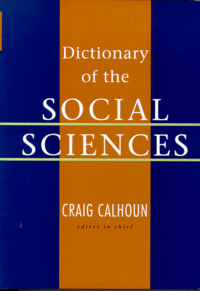

![]()
![]()

A shared lexicon is timely as research in social sciences no longer respects disciplinary boundaries. To compile such a resource is, however, a challenging task. In the absence of undisputable definitions of what constitutes the social sciences, Calhoun and colleagues have worked out an operational definition of the social sciences: "Our approach was to cover all of some academic fields and some interdisciplinary fields, and only parts of others where these seemed to fit ambiguously into the social sciences. Here, we have stressed the first word in social science, emphasizing coverage of those fields that most clearly focus on social phenomena and relations" (p. xiii). The editors aim to cover economics, politics and sociology in their entirety, whereas disciplines such as anthropology, geography, history and historiography are only covered in part. The listing of the interdisciplinary fields covered and the discussion of the "boundary work" the editorial team have engaged in highlight the magnitude of the enterprise.
The end result is an impressively fluent lexicon. It is both interesting and informative to leaf through the pages of the Dictionary. For the review I have both read entries at random and looked up terms I am familiar with. The book lives up to the stated aims of clarity. The entries are concise and cross-reference between entries is often thoughtfully applied. Problems occur with entries on concepts that are used in several disciplines but in somewhat different ways: for instance, entries related to consumption lack recognition of the high-profile sociological discussions on the topic. Another example is that Simmel is not mentioned in the entry on money, even though Simmel and his work on money are covered elsewhere in the book.
It is perhaps precisely the broad scope of the undertaking that leads to these and other similar gaps. One cannot, for instance, help to wonder how concepts such as the body, consumer culture, health, illness or welfare state have not been included in the book. It might very well be, as Craig Calhoun suggests in the preface, that in order to achieve a comprehensive dictionary several editions are needed, as revisions then will be possible. Because the Dictionary is a worthy and very promising effort to bring together the social sciences I hope that new editions will follow in future. It might also be useful at some point to create a parallel CD-rom resource to complement the existing social science indexes and journal databases.
Calhoun comments in the preface that the Dictionary "describes mainly social science as it is conducted in English" (p.xiv). This awareness of language as a formative condition and the international background of the editorial team has helped to make the Dictionary "extrovert" in relation to the social sciences as an internationally shared frame of reference. However, the book appears to be written primarily to an American audience and has an "intellectual home" in that scholarly and cultural community. For future editions, the publisher might consider taking steps to make the Dictionary even more international in its orientation. It is evident that there is an international audience for dictionaries like this. All over the world, social scientists for whom English is not the first language are in part or completely conducting social science in that language. This means a worldwide potential market, but also an exciting opportunity to develop the lexicon by giving it several intellectual homes.
Even with its American flavor, the Dictionary will surely find many friends. Especially for students and teachers who struggle to either become or to stay fluent in social science terminology, the Dictionary is a useful companion. Its broad scope recommends the Dictionary to the shelves of all social scientists as a resource that helps to share the vocabulary of social science.
Sirpa Wrede
Åbo Akademi University, Finland